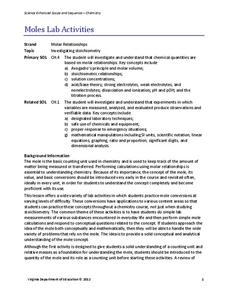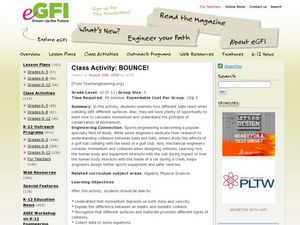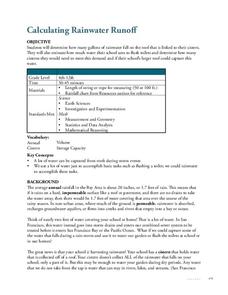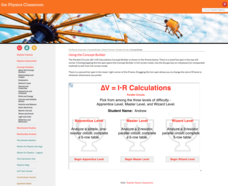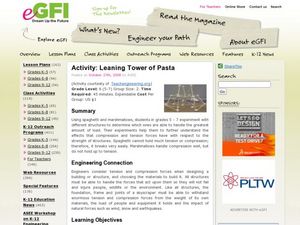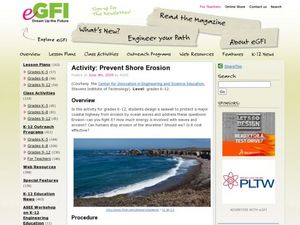Howard Hughes Medical Institute
DNA Profiling Activity
Everyone loves a good mystery ... can your class actually solve one? Partnered pupils take on the role of forensic investigators during a three-part activity focusing on DNA evidence processing. Learners discover the methods used to...
Curated OER
Moles Lab Activities
General chemistry class members engage in a mini-unit on mole conversions. Through nine lab activites with varying degrees of difficulty, they practice measuring mass and volume, molar calculations, and stoichiometry. Terrific...
Chicago Botanic Garden
Calculating Your Ecological Footprint
You can lower your ecological footprint by recycling! Lesson four in this series of five has individuals, through the use of a computer, calculate their ecological footprints. Through discussions and analysis they determine how many...
Curated OER
Class Activity: BOUNCE!
Kinematic equations are used to calculate the velocity and momentum of different types of balls bounced on different surfaces. The lesson plan is detailed and provides a materials list, background information, and procedures....
Chicago Botanic Garden
Micro-GEEBITT Climate Activity
A truly hands-on and inquiry based learning activity bridges all the lessons in the series together. Beginning with a discussion on average global temperatures, young meteorologists use real-world data to analyze climate trends in order...
Howard Hughes Medical Institute
The Great Elephant Census Modeling Activity
They say elephants never forget—and your class won't forget an insightful modeling activity either! Junior zoologists take part in a mock elephant census using the sample count and total count methods. The included materials provide...
Teach Engineering
Start Networking!
Class members create their own social networks by collecting signatures before graphing the interactions with their fellow classmates. The degree distribution of the simulated social network is determined by calculating the degree of...
Teach Engineering
Density Column Lab - Part 1
Mass and density — aren't they the same thing? This activity has groups use balance beams and water displacement to measure several objects. The pupils use the measurements to calculate the density of the objects.
Teach Engineering
Swinging Pendulum
Get into the swing of things. Pupils use a pendulum to demonstrate the conversion of potential energy to kinetic energy and back. After measuring the speed of a pendulum and compare it to the calculated theoretical speed, they...
Learning Games Lab
Logarithm Calculator
Support your young scientists' knowledge of logarithms with a quick video lesson. The instruction first presents the relationship between a base-10 logarithm and an exponential equation. It then demonstrates how to use a calculator to...
Techbridge Curriculum
Calculating Rainwater Runoff
Thirsty plants soak up every bit of a rainfall, but what happens to the rain that hits the roof? Calculate the amount of rainwater from your school's roof with an Earth science activity, which brings measurement skills, observation...
Royal Society of Chemistry
pH 4: Activity
Sometimes playing games in class isn't a bad thing. Science sleuths evaluate and calculate pH and pOH with an online resource. They then manipulate concentration information and relate it during a series of puzzles.
Virginia Department of Education
Moles Lab Activities
Want my name and number? It's 6.0221415 times 10 to the 23rd, and my name is Avogadro. Providing nine different activities, experiments, and labs, this activity keeps Avogadro relevant to your class all year long.
Physics Classroom
Parallel Circuits - ∆V = I•R Calculations
Parallel circuits often provide less of a challenge for teens than parallel parking. An installment of a series on parallel electric circuits requires learners to solve increasingly difficult levels of calculations. Each level...
Cloud Front
Weathering, Erosion, and Landforms—Student Activities
Tired of your students taking you for granite? Use a unit that offers multiple hands-on weathering and erosion labs and interactive activities. Some of the exciting lessons include planning a tour of Australia, using ice...
Curated OER
What's The Story?
Teams of learners integrate reading, writing, math, social studies, and science in this simple, yet effective lesson. They work in groups in order to solve a ten-step problem which requires internet research, the use of a calculator, and...
GLOBE Program
Calculating Relative Air Mass
Combine math and science with fun in the sun! Scientists build a solar gnomon using reusable materials to calculate relative air mass. Mathematicians measure the pole's shadow and use the data to solve for relative air mass....
Give and Let Live
Blood and Transplant: Blood
Why is blood donation so important, anyway? Science and health classes across multiple grades benefit from an in-depth look into the need for and process of blood donation. With an emphasis on presenting the topic in a non-threatening...
Curated OER
Activity: Leaning Tower of Pasta
A well-laid-out lesson plan, this can be used in an engineering, STEM, or physical science course. Laboratory groups design a structure using pasta and marshmallows, measure its height and weight, and then discover the load that it can...
eGFI
Activity: Prevent Shore Erosion
After calculating the amount of energy in a wave, future engineers plan and present to the class a design for a seawall that will minimize erosion on the shore. Not only must they consider the energy that will impact the wall, they also...
Curated OER
Respiration
This series opens with diagrams of experimental setups. A data table is displayed and questions are asked, indicating that the intent is for lab groups to perform the depicted experiments. At slide twelve, a coherent lesson about the...
Royal Society of Chemistry
pH 2: Activity
Pupils puzzled over pH? Incorporate an interactive resource that teaches through games! Chemistry scholars use reasoning to solve puzzles that focus on determining the pH based upon hydrogen ion concentration.
Las Cumbres Observatory
Calculating the Age of Solar System Objects
The number of craters on the surface of solar system objects has a direct correlation to its age. Learners use the concept to determine the age of several objects in the solar system. Using satellite images, they count craters within a...
Texas Instruments
TI-Nspire™ CAS
When it comes to rating educational calculators, this calculator is always near the top of this list. Now it's available as an app. There is a lot of calculator power wrapped up in this app. Not only is this a fully functioning...

